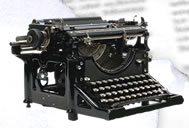Saturday night in Stalin's Moscow: so much to do! If you wanted to take your date to a Russian movie you could go to
Battleship Potemkin, or you could take her to
Battleship Potemkin, or to
Battleship Potemkin! On the other hand, you might choose a foreign movie that was approved by the all-knowing Soviet apparatchik, and in that case the two of you would see a Charlie Chaplin movie - and we'll give you one guess as to which one he liked.
Click here if you want to know what films Hitler liked.
During the Second World War in the United States it would have been an act of treason for a journalist to write a slanderous profile about any of the leaders of the allied nations who were beset against the Axis powers. Not only would the writer face grave charges, but so would his editor and publisher. However, this does not mean that the editors of
Coronet Magazine had to go so far over the top as to publish this article by the Soviet cheerleader
Walter Duranty (1884 – 1957) of
The New York Times.
From Amazon:
Stalin's Apologist: Walter Duranty: The New York Times's Man in Moscow
When the attached article hit the newsstands in May of 1952 Joseph Stalin had less than a year to live and like most totalitarians living on borrowed time, the heavily guarded diminutive dictator had his public appearances drastically reduced in number:
"Today he lives in isolation unrivaled by any monarch since the Pharaohs. He must have forgotten what he himself once told the historian Emil Ludwig: 'Any man on a high pinnacle is lost the instant he loses touch with the masses.'"
The article has a fair amount of Stalin minutia you might find interesting.
This column will give you a quick understanding as to how 1950 ended:
"Russian diplomats made valiant efforts. In Moscow, [Stalin's adviser] Andrei Gromyko called Western envoys, urging Big Four talks to 'unify' Germany. In the U.N., Andrei Vishinsky protested Russia's 'devotion' to peace and to the belief that capitalism and Communism could live in the same world... But while the Reds talked, Chinese Communists had swept into the Korea War. The Soviet military budget had soared . Russia's submarine fleet had multiplied, it's air force had expanded to 14,000 combat planes, its army was millions strong, and still growing."
Stalin's final days, as recalled by his daughter, Svetlana Alliluyeva (1926 – 2011), were mired in paranoia; he had imprisoned his one physician (accusing him of being a British spy) and refused all medical attention - preferring to self-medicate with liberal doses of iodine. His hatred of the West had drastically intensified; he rambled on about the natural intelligence of peasants and was displeased that numerous members of his family wished to marry Jews.
(Click here to read another article about the 1953 death of Stalin.)
Read about the "Soviet Congress"
Unquestionably, the most famous individual to defect from the USSR and seek refuge in the West was Svetlana Alliluyeva (1926 - 2011), the only daughter of Soviet Premier Joseph Stalin (she used her mother's maiden name). She was the one closest to the aging dictator during his closing days - and her defection to the United States aroused a tremendous amount of interest throughout the world. In this interview she claimed that her defection to the West was primarily inspired by her yearning to write freely. Dutiful daughter that she was, Alliluyeva stated that the guilt for the crimes attributed to her father should be equally shared by those who served in the Politburo at the time.
- from Amazon:
Stalin's Daughter: The Extraordinary and Tumultuous Life of Svetlana Alliluyeva
Here is an expose that revealed the hypocrisy of Stalin and the Soviet party members - who spoke of the inherit nobility of the laboring classes and the triumph of "the worker's paradise" while they lived like the czars of old:
"The children of the country's rulers already regard themselves as the hereditary aristocracy... The absence of a free press and consequently, of public criticism, allows them to retain this psychology even beyond their adolescence."
Bromance was in the air when Harry Hopkins (1890 - 1946) went to Moscow to meet Joseph Stalin (1876 - 1953) for their second meeting:
"He shook my hand briefly, firmly, courteously. He smiled warmly. There was no waste of word, gesture, nor mannerism. It was like talking to a perfectly coordinated machine, an intelligent machine. Joseph Stalin knew what he wanted, knew what Russia wanted and he assumed that you knew."
Mic-drop.
A few months after
PM Daily was established, the editor announced that he had gone to great lengths to purge their ranks of Communists. However, as the attached movie review makes clear, they missed one. While the rest of the country was absolutely scandalized by the pro-Soviet Warner Brothers production,
Mission to Moscow (1943), Peter Furst, the reviewer in question was absolutely delighted:
"The film reflects the undisguised admiration of [U.S. Ambassador Joseph E. Davies (1876 – 1958)] for Joseph Stalin and his government, as well as the Ambassador's conviction that the famous Soviet 'purge' trials of 1936 - 38 were based on proof 'beyond a reasonable doubt' that the former leaders punished were guilty of plotting with Germany and Japan for the overthrow of the Stalin regime."
"What kind of a man is Joseph Stalin? How does he get along with his family? How does he treat them? I can tell you. Because for many months I was the French tutor of Stalin's daughter, Svetlana, At Stalin's country home. I met Stalin himself numerous times."
